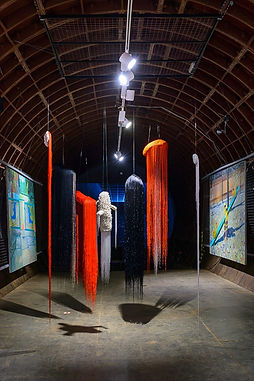

Already at the beginning of her creative path, Ustina Yakovleva started to search for the true method to objectify her vision beyond traditional painterly vehicles and artistic disciplines. She found own matter and technique in the folk embroidery practices of the Russian North, where Yakovleva’s family lineage originates. Among many connections to this belief system, Ustina identified three main concepts as the basis of her art: deep intuitive relation to nature; careful observation of the surrounding world; a respect for the slow pace of time and meticulous work. Offering insights into regional forms of expression, Yakovleva examines how folk iconography can be relevant in contemporary creative approaches and explores intersections between fine and applied arts. Through embroidery as a medium, her body of work becomes the vehicle for the archaic collective knowledge with reference to media, social, and style history.
Born in Moscow, Russia, in 1987, Ustina Yakovleva studied in Moscow State Pedagogical University (Graphics Faculty) and Institute of Contemporary Art (Moscow). In 2020 Yakovleva was the grant laureate of AES+F Artist Residency Award (New York). Among the residency she participated in are ISCP residency (New York, USA), NCCA residency (Kronstadt, RU), PROGR residency (Bern, CH), Garage residency (Moscow, RU). Ustina’s works are held in private collections in Russia, Great Britain, France, Germany, Austria and Holland.
Yakovleva especially appreciates the slow, meditative process of embroidery: Through the gradual increase of graphic elements and details, the artist develops an individual narrative and creates a space of self-revelation. Capturing passage of time in its material form, concentrated repetition of the same tranquil gestures enables Ustina to become aware of her own physical existence, focus inward and leave the everyday. While confronting through this procedure true and meaningful experiences with the fast pace of modern life, she emphasizes the labor-intensive and contemplative facets of the creative act. Thus, Yakovleva links her art to traditional women's crafts and challenges the anonymity and invisibility of the embroidery medium.
A significant aspect of Ustina’s oeuvre revolves around the theme of natural processes and their impact on creative ones. Change as a vital principle of life is present in every segment of her art, enabling works to be perceived as vital organisms: The single elements - beads, strokes, lines - develop in a constant flux and unite into complex structures akin to evolutionary growth cycles.Via this approach, she establishes a relationship to nature as a living entity to which we also belong. However, the artistic dimension of Yakovleva’s work is defined by the manual manipulation over the creative process through embroidery techniques and the imprint of her personal expression and existential feelings.
Download selected works